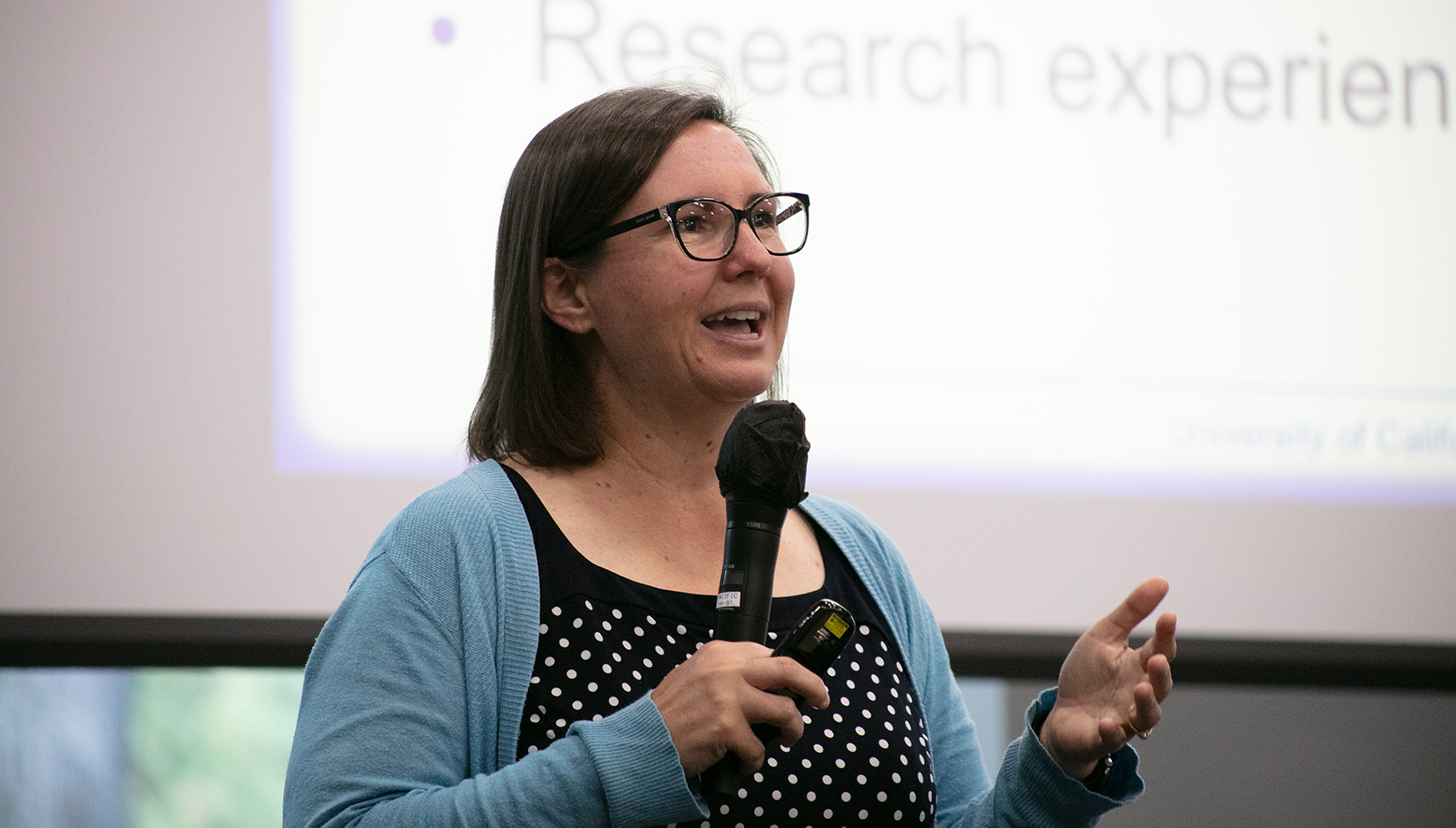
Lukowski inspires Anteaters who are first in families to attend college
“I’m a first-gen, and I’m also a non-traditional student,” post-baccalaureate psychology student Ashley Leon informs the guest speaker. “It’s been a challenge with feeling inferior and imposter syndrome. I’m a much older student, and I still deal with it all the time. And one of the questions that I’ve been asking myself this week, specifically because it's midterm week, is do I even belong here?”
Guest speaker Angela Lukowski conveyed that she could relate with Ashley or anyone else experiencing similar feelings.
“It’s something that I still struggle with,” said the associate professor of psychology.
Lukowski was delivering the First-Gen Faculty Talk during UC Irvine’s First-Gen Day on Nov. 5, which was three days before the national First-Generation Student Day that fell on a Saturday. Student Success Initiatives hosted the talk as well as a resource fair “to uplift and celebrate the resilience, pride and accomplishments of our first-generation community,” said SSI’s Retention Program Director Brighitte Preciado while introducing Lukowski.
The professor of the hour was not only a first-gen college student and graduate, but she is the first in her Wisconsin family to join a university faculty — and in her talk she touched on the challenges of having been all those things.
But first, let’s return to the rest of her answer to Ashley.
“There was a grant application that was due on Monday,” the scholar informed. “I got started on it late. You know, I probably did not put all the time into it that I should have. And so, on Monday I had the whole thing ready to go. And I sat there with it open on my computer, thinking to myself, ‘I’m just not going to click the submit button.’ Like, what if somebody sees this and they say it’s not good enough, or she should have worked harder?”
Lukowski’s remedy for this bout of imposter syndrome mirrors as advice to those facing similar struggles: She phoned a friend, who is this case is her best friend Joanne Zinger, professor of teaching psychology at UC Irvine.
“I said, ‘What do I do? Like, I’m really struggling with this.’ And just her saying, ‘Click the send button’ allowed me to do it,” Lukowski says. “That is something that first-gen people battle with over the course of their careers, I would imagine. I mean, I’ve been doing this for a long time now, and I’m still battling it.”
Her humble beginnings are likely at the root of her struggle. When she was young, Lukowski’s father worked for an automobile manufacturer and her mother was a homemaker. She attended the small, private Carthage College in Kenosha, WI, to study music, but a psychology class she took her freshman year convinced her to switch majors. Because Carthage only had 1,200 students back then and faculty were so involved in students’ success, she didn’t fully realize what it meant to be a first-gen student at the time.
The undergrad’s love of psychological research drew her to the University of Minnesota and its nationally lauded graduate program in child psychology, where she admitted to feeling “like a very small fish in a very big pond.” That is where Lukowski believes she experienced the most first-gen challenges that resonated with the Anteaters who came to her talk. She recalled telling her parents how tight money was—and how they recommended that she get another job. As any grad student will tell you, graduate school does not lend itself to much spare time.
Lukowski was quick to absolve her parents of any undue pressure, instead praising them for playing a role in her future success.
“As a first-gen college student, there are many barriers to success,” she said. “You must think about the goals that you want to achieve over the long term and how you’re going to get there.”
She says her first-gen experience fills her with pride.
“I think about my history and the culture that has allowed me to be where I am today, both in terms of broader societal changes as well as my own family,” she says. “I think about my paternal grandma who came to the United States from Poland when she was a 1-year-old and all the struggling she and her family endured to have my dad and his two brothers and all the struggling my parents endured to allow me to be here today.”
Lukowski’s first-gen story is not all about her, she explained, it is about the interactions that occurred along the way.
“There are so many environmental supports and individual agents that helped contribute to me being here today,” she said. “So, the story is about my social relationships, right? Like the connections that I have, the advice that people gave me, the people that I reach out to for assistance.”
Referencing the guest speaker’s words and slides projected onto a screen as part of her presentation, Ashley said, “Just seeing those words, they like really got to me and choked me up. So, thank you so much for just being a wonderful inspiration for students.”
“Actually,” Lukowski said, “thank you. That’s so kind of you. I think it is worth it. It is worth it to undergo this fight and continue doing this day-to-day-to-day, to allow other people to see that it’s possible to overcome and get here.”
— Matt Coker
Features